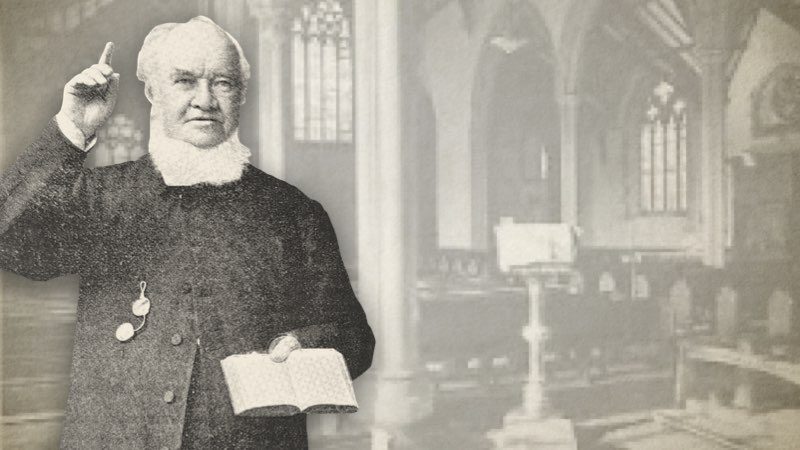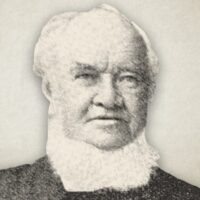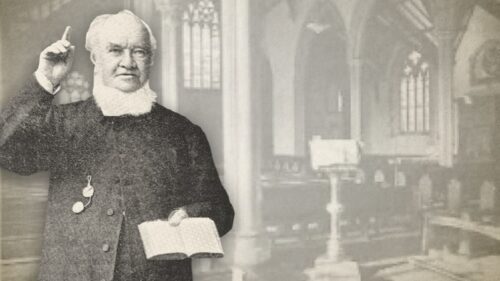
A Remarkable Deliverance
“Somebody hath touched Me!”—Luke 8:46
The circumstances under which these words were laid on our mind may be, perhaps, profitably stated.
A poor, greatly tried and exercised brother had been for many days in deep distress, on account of the near approach of a certain hour of all-involving temporal difficulty. Again and again he had laid his case before the Lord, and entreated Him to speak a word to him, by which he might gather that the Lord was on his side; but all was in vain. Every petition he attempted to send up appeared to come back with the seal unbroken-unopened. Each succeeding morning brought heavier clouds, more darkness, and increasing coldness, until the dreaded day came, when, instead of the needed calmness and composure, all was turmoil and confusion. The day had arrived, with scarcely a single ray of probability that a deliverer would appear. The day dragged on to the appointed hour, still all around portended destruction. In one short hour the storm and tempest would be unchained, and all must be swept to ruin. The crisis was a solemn one indeed, and none but those who know, by feeling what it is to stand amidst such terrible things, can understand such a position.
The poor brother, at the last moment, retired to his usual hiding-place, expecting nothing short of the fulfilment of his worst fears, but desiring to meet the explosion while clinging to the Rock. Prayer seemed long to have ceased. Nothing now remained but a “falling down, with none to help” (Ps. 107:12) At length, however, after remaining a long while, as it were, stupefied by intense anxiety, and led more by custom than by any expectation of help from that quarter, he took from his pocket his little Bible, and, clasping it in his hands, gave one imploring upward look, and opened it. His sensations could not have been more palpable or instantaneous had a flash of lightning struck him. His eye rested on the words, “Somebody hath touched Me.” The ray of glory that shone upon the simple statement cannot be described. Those only who have had a word similarly spoken into the heart by the Holy Ghost, with all the power and majesty of God, can comprehend the astonishing effects produced upon a poor heart-broken worm of the earth, at such seasons of bitter distress, by the arrival of such a messenger of peace as this.
In a moment the dark cloud was withdrawn, the thunder ceased to roll, the tempest was hushed, and the stormy billows of destruction which, but one instant before, were swallowing up the sinking one, heard a voice from heaven, saying, “Peace, be still!” and there was a great calm. The heart of the trembling one filled to bursting with love and wonder, as the small, still voice swelled in its melody into all the magnitude and glory contained in the precious words of Jehovah-Jesus, “Somebody hath touched Me!”
A single glance of the reviving hope, and strengthening faith, told the poor brother that, in his sad condition, he himself was included in that blessed word—that, undone as he appeared to be, he had “touched” the Lord. Astonishing conclusion! “What!” said he; “I—poor I—unworthy rebel that I am—I that ‘somebody’? I, that am less than nothing, declared to be somebody, and that somebody that hath touched the Lord of glory?” Yes, it was even so. The power, the life, the warm, dissolving effects of the gracious words, were enough to crush every doubt, had any arisen, that the word was as truly spoken respecting our poor brother as it was respecting the woman in the Gospel.
But what did the word spoken convey? Simply that the Lord had been “touched.” Ah! bless His glorious royal bounty! Truly, without impiety, may it be said of Him—
“His bounty’s boundless as the sea;
His love As deep; the more He gives to thee the more
He has, for both are infinite!”
When He comes to one of His own travailing children with a “word in season,” it is never an empty word. His words are not shadows; ah! no, but a blessed substance—“Thy words were found, and I did eat them.” “Man shall not live by bread alone, but by every word that proceedeth out of the mouth of God” (Matt. 4:4). “How beautiful upon the mountains are the feet of Him that bringeth good tidings, that publisheth peace; that bringeth good tidings of good; that publisheth salvation; that saith unto Zion, Thy God reigneth” (Isa. 52:7). This is the blessed substance of every fresh word brought by the power and unction of the Holy Testifier of Jesus to the troubled soul of one of His afflicted children. Hedged in on every side by mountains of difficulty, without any apparent possible way of escape, the Bearer of the message of mercy comes “skipping over the mountains”; and when He drops the living words into the heart, be what they may, or under whatever circumstances, these are the three substantial blessed testimonies of bounty the gracious words contain—peace; salvation. “Thy God reigneth.”
“How can we sink with such a prop,
That bears the world and all things up?”
Such was the substance of the precious words spoken to our almost shipwrecked brother—“Somebody hath touched Me!” For a long time he stood gazing with wonder and love, admiration and gratitude, at the goodness of the Lord, weeping out his exclamation, “Oh, how good is our God?” And, although he could see no change in his circumstances, yet he could feel the peace, and hold salvation from his pressing difficulties sure, because be could say to his soul, “Thy God reigneth.”
And let the sequel stop the mouth of gainsayers, who would fain write ”enthusiasm,” “fanaticism,” or “superstition,” on this simple literal statement of facts. While this poor brother was thus engaged behind the scenes with his God—while he was listening to the promise of help—at the same moment the Lord’s Cyrus was under the same roof, although unexpected and unknown, working the deliverance of the captive wrestler; so that, when the poor brother again appeared, “with his countenance no more sad,” he was presented with the weapons by which the violence of the oppressor was converted into the most signal triumph of the oppressed. “Whoso is wise, and will observe these things, even they shall understand the loving-kindness of the Lord” (Ps. 107:43).
Reader, hast thou some rankling, secret, soul-distressing trouble or anxiety? No matter how small it may appear in the eyes of some, or how great it may be in fact, is it constantly seizing and dismaying thy poor, trembling heart, and, day by day, as thou art traveling onward, surrounded by a thousand mercies, whispering to thee, as each fresh favour is surveyed, “What availeth these, while this Mordecai still sits in the gate?” Fear not! When the sinking moment comes, and not until then, the arm of the Lord shall be seen, and thou shalt kiss the rod which led thee, in thine extremity, to touch the Lord. But thou art not to expect Him to acknowledge the touch until every other refuge has failed.
While thou hast a single prop left to lean upon—while thou art able to touch this or that fleshly helper—although thou mayest be constantly, according to feeling, pressing through the crowd to touch the Lord too, yet thou art not to expect Him to say to thee, in the same full manner as He did to our poor brother, “Somebody hath touched Me!” But, if the ways of escape are narrowing, if the props are failing, if the dangers seem multiplying, if all fleshly strengths are rapidly declining, then “look up!”
David Doudney (1811-1893) was a sovereign grace preacher belonging to the Church of England. Around the year 1858, he was appointed the minister of St. Luke’s, Bedminster, Bristol. He oversaw the republication of many valuable works, among which were those belonging to John Gill and Robert Hawker. For fifty-three years he also served as editor of “The Gospel Magazine”. John Hazelton wrote of him:
“David Alfred Doudney, D.D. (1811-1893), for fifty-three years editor of “The Gospel Magazine,” was in many respects one of the most "useful ministers of the century. To an enormous capacity for work, he united great literary ability, business aptitude, and a winning personality. We would magnify the grace of God in him, and many of the Lord's people in all parts of the world to-day can testify to the fragrance of his memory and the savour and power of his sermons and writings. He was firm in his adherence to the distinctive truth of God, and at the same time manifested a kind and brotherly spirit. The Church of God owes him a great debt for his wonderful edition of "Dr. Gill's Commentary," completed in January, 1853, and followed by reprints of Gill on "The Canticles," Hawker's "Morning and Evening Portions," Hart's "Hymns," Rutherford's "Letters," and other choice works. In 1858 he left Ireland, and was soon after appointed to St. Luke's, Bed-minster, Bristol, where he lived and worked till near the close of his strenuous life. He was an admirable writer of gospel literature for the young and the poor, as "Try, Try Again," and his monthly publication, "Old Jonathan," brightly testify. He loved little children, and was never happier than when in the midst of his large schools. One writes: “O those capacious, well-filled pockets! I used to tell him I should like to have the pattern of them! Yes, who would not wish for his generous spirit and warm heart, ever ready with 'Old Jonathan,' or booklets, or some pretty present? I possess—and I have heard many others make the same grateful assertion—quite a little library of the doctor's kind gifts. Foremost a Bugster's Bible; and another book which was a valued treasure of his and ever will be also of mine—Toplady's Hymn Book. I know that in giving me this he bestowed the highest token of personal friendship. When on his dying bed and unable to speak much he asked that the following verse might be written out, and then he dated and signed it as his experience:—
'Jesus can make a dying bed
Feel soft as downy pillows are;
While on His breast I lean my bead
And breathe my life out sweetly there.'
One of his highly valued friends—John Martin, M.A., of the Circus Church, Portsea—conducted the funeral service in Southsea Cemetery. Mr. Martin, who has since followed him to his heavenly home, was a member of an old and highly esteemed family in the Isle of Ely, and for many years exercised a powerful free grace ministry in Portsmouth.




